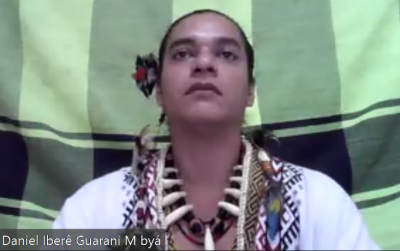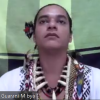Introduction
Talk by Mr Iberê Guarani Mbyá, Leader, Guanary People, Brazil at the webinar on Water and Spirituality for Climate Adaptation on the 19th of Oct 2021.
Hello, good morning.
I ask permission from all our ancestors, from the original peoples who since before time existed have walked across these places.
I am Guaraní, for us a word is very important and that is why we keep silence within the extension of the words so we can pause to listen to everything around us everything that vibrates, everything that pulses I ask permission to “Jasuka Sy Ete”
Jasuka is our first mother, the last and first one.
Jasuka is all that vibrates, all that pulses
She is our first mother
[she is] pure and crystalline,
and from her all the visible and invisible beings sprout/bloom/flourish,
humans and non-humans.
My name is Iberê, in Guarany this means the ‘path of water’,
it is how we walk, how we learn to cultivate the silence.
We learn how to walk and follow our path,
we learn to get around what they call obstacles.
We are water, but we forgot about that.
For us, those that are walking through all these times,
we aim to cross this world
- a world of inequalities, a world of injustices -
and reveal a heart that is pure and transparent
when we traverse this earth and come by the things that die.
In our language, we say
“ovo m’bahe ngua”, earth of the things that die.
Our meaning is to be mature as a ripe fruit.
When a fruit is ripe, we say that it is in the state of “aguyje”
When a shaman, an elder, is mature and fulfilled, and we cannot see its body anymore, in which he reveals the last and first word,
we say he is in a state of “aguyje”.
When we thank someone, we wish them from all our heart
that they may be in the state of “aguyje”.
This is our path. But we walk in a world of inequalities
and we often cry.
They burn our territories. They expel us from them.
They burn our forests.
The garbage suffocates us,
the hoof of the ox hurts the ground.
We look to our great mother,
For we have no way of helping life
we ask her how to rescue the living beings,
and even then (in all that sorrow), we seek to be without desire in our hearts,
and without having any enemies.
We sing every day to soothe the colonizer’s heart,
so that his continental thirst may not be so great that he will start to eat himself.
This is what we do.
(Because) we live in a world, our world,
and we learnt that all of us are related,
just as all beings that vibrate and all that pulsates.
Just like our great mother Jasuka Sy Ete, who we come from,
our words
the words of the spirit which lives inside the body that we see,
they all come from the same original source,
and that’s why we always say that we are all relatives.
We are relatives of all that lives, and all that pulses.
We are relatives of all that flows and all that unfolds/bends.
We are all related.
The hawk is a relative of the snake that unfolds itself, as if unsheathed.
The wind blowing on the water, in the air, forming words.
These are the beautiful words of our grandparents.
We are relatives to those that live in the water,
together with Jasuka Sy Ete, the first mother,
the great-great grandmother of the grandmother we see.
We are relatives of the dead and of the mountains,
relatives of “Yamandu” whose heart is the sun,
and the great-great-grandfather of this sun that we see.
To be here, to talk with all of you, I had to walk many kilometres to get internet
Outside, it is raining, our great mother wets our faces.
When this meeting is over, we will go home once more.
We will go upriver for twelve hours.
So, I am grateful to all of you that are here.
Hence, (I am saying) these words.
And may these words touch your hearts,
May they talk with your silences.
We live today in a world in which 45,000 dams have been built,
that have already expelled more than 80 million people from their lands.
In Brazil, they are more than 2,000 dams, and they want to construct 4,000 more,
for the supply of water, or for the production of energy.
And 650 of these are hydroelectric plants,
and their dams have already expelled more than one million people.
We live in this time, a time when looking inside,
at the rivers that run through us,
and make us look at that what apparently is outside.
The rivers are flowing outside of us. There is no inside, and there is no outside,
the rivers are embracing and kissing the earth,
the rivers are below the earth, and the rivers are flying,
Our rivers are flying beings:
when the streets and dams get in the way
they rise and go far away to bathe other parts of the continent.
So this is what we do; we know that, for the rivers to continue on their course, we must respect and preserve diversity.
The poverty of the world is a poverty of diversity:
One language erasing thousands of languages;
one religion erasing thousands of ways of dealing with what is sacred
one culture, one education.
But we, the original peoples, are from before time existed,
We go on and on, cultivating and sowing life,
making the rivers flow inside and outside of us.
A river that is stagnant river is a life that fails to flow.
If we stop a part of the river that runs through our body, that part withers and dies.
A stagnant river is a sad river, it’s a river that is alone/miserable.
We cannot allow it to be alone.
We live in a country with 83,000 km of rivers,
83,000 km of rivers, and all of them polluted.
There are 32 million Brazilians that have no tap water,
and 11,5 million live in homes with more than three people per room.
5,8 million do not have a bathroom, and the rivers are all contaminated.
7,6 million people are homeless, and that in the same country there are 7,9 million unoccupied homes.
There is no potable water in anyone of the indigenous communities,
and in São Paulo and in large cities like it,
it rains the entire periodic table as well as faecal coliforms.
This so-called civilization, this alleged development,
- that wants all of us anonymous to everyone and known by no one –
forgets, that rivers teach us the grammar of uprising.
Our rivers are insubordinate.
People build dams, the rives will part
and they show us that we must not be restrained, that we cannot be too embarrassed to speak.
But we must instead plant the seeds of life, and continue the ancient paths,
respect our ancestors, and make sure that everything that vibrates and all that pulses
can vibrate and pulse in itself.
This is a world, which harbours many worlds, our worlds, all in communion,
in the possibility of “bem viver” (living well) and “com viver” (living together)
Bem viver (good life) is an expression that was created a while ago
but it draws on (lit: drinks from) the wisdom of the original peoples
and, therefore, it is not about being one alone, it is not about being an individual.
It is about millions, about thousands, and it expresses the ways of being,
thinking and feeling of each and every one of us.
We, the original peoples, respect everything that surrounds us,
because everything that surrounds us, is also us, it’s our elders who come to visit us.
When we feel a lot of saudade (the feeling of missing/longing/nostalgia)
and miss those that have parted, and we feel the desire to be with them,
the wind wets and blows in our face: it is our ancestors caressing us.
And so we go on.
Perhaps the civilized people, perhaps the ones who emerged,
were born and grew up in the cities,
might not know, might never have gotten to know the beauty of simplicity and imperfection.
We, being simple and imperfect, learn from everything that is around us.
A society of speed, a society incapable of experience,
a society in which nothing touches the heart.
My time is up, I have a lot to share with you, and I have learned a lot.
I am grateful; may we go on / let’s follow our paths, learning with the rivers, learning the beauty of simplicity,
and may our hearts be one day pure and crystalline, like the great spring from which we came
and to which, if all goes well, we may return, and have a great feast together.
“Arive te a jevete”
Translation from Portuguese by Clara Butow and Grace Perpétuo








Trending Discussions
From around the site...
“Absolutely interested! I'll connect via email to discuss reviewing and enhancing the Economic Analysis of Climate...”
Adaptation-related events at COP28 (all available to follow/stream online)
“Please check out these adaptation-related events taking place at COP28 - all available online (some in person too if...”
Shining a light for biodiversity – four perspectives to the life that sustains us. Four hybrid sessions.
“30 November to 19 December 2023 - Four Sessions Introduction The SDC Cluster Green is happy to invite you to the...”